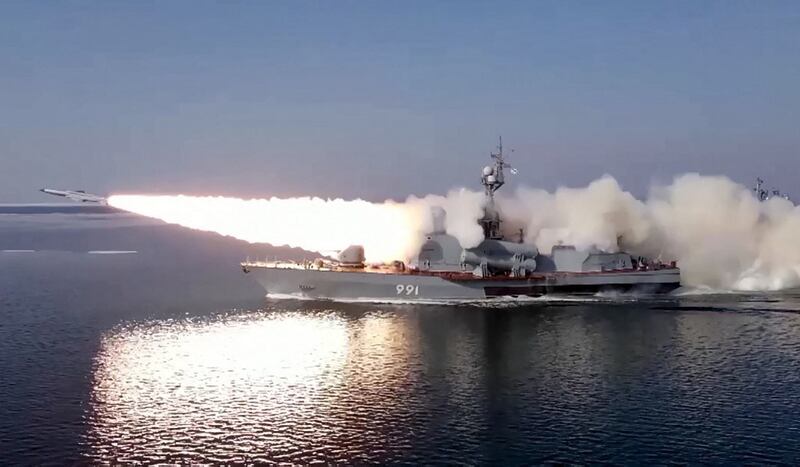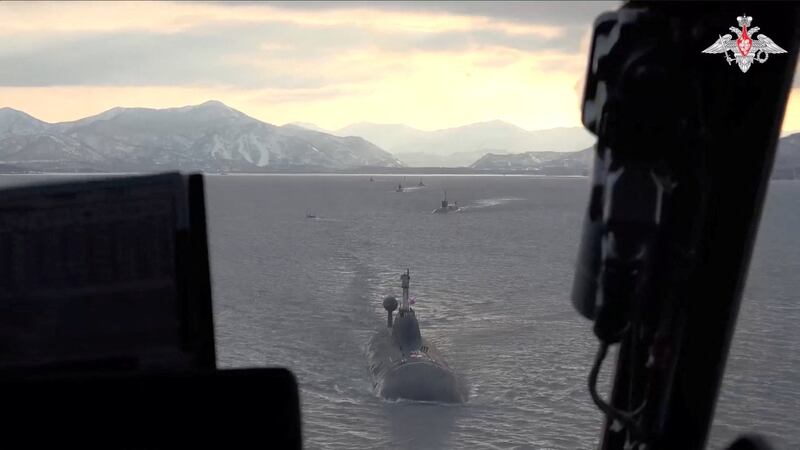China’s new U.S.-sanctioned Defense Minister Li Shangfu visited Russia this week, his first foreign trip since taking office, as Beijing and Moscow align closer to confront the U.S.
Gen. Li was received by President Vladimir Putin on Sunday, almost immediately after he arrived in Moscow. During the four-day visit, Li also held talks with his counterpart Sergei Shoigu and paid a visit to Russia’s top military academy, the Military Academy of the General Staff of the Russian armed forces.
"New progress has been made in strategic communication, joint exercises and training, and practical cooperation, which enriched the strategic connotations of the China-Russia comprehensive strategic partnership of coordination for a new era," Senior Col. Tan Kefei, a spokesman for the Chinese Ministry of National Defense, said in a news release without giving further details.
The Russian and Chinese ministries of defense “reiterated their joint resistance to attempts by external forces to interfere in each other's internal affairs,” Tan said.
Li’s trip took place less than a month after the state visit by Chinese leader Xi Jinping, Xi’s first foreign tour after being re-elected as China’s state president.

China and Russia have been seen as trying to form a new world order and the presence of the head of the Chinese People's Liberation Army could signal a "new military alliance to challenge the Pentagon," said a commentator in China Today, a Beijing-supported supplement of Russian news portal Svobodnaya Pressa.
Konstantin Olshansky said that the trip shows that “Beijing openly supports Moscow in the Ukrainian conflict.”
China has so far refused to condemn the Russian invasion of Ukraine but maintains that it would not provide weapons to either side of the conflict.
Luke Coffey, a senior researcher at the Hudson Institute, a U.S. think-tank, said in an interview with RFA Mandarin Service that Russian and Chinese presidents had likely discussed “possible ways that China can support Russia’s invasion of Ukraine both diplomatically and through logistical support.”
Sanctioned by the U.S.
Li Shangfu, 65, is an aerospace expert. He became China’s defense minister at the National People’s Congress in March.
In 2018, Li, then-Director of the Equipment Development Department of the Central Military Commission, was sanctioned by the U.S. State Department for purchasing Russian combat aircraft and equipment related to the S-400 surface-to-air missile system.
The sanctions mean “direct contacts between the Minister of Defense and his counterpart in the Pentagon” are impossible, said Adil Kaukenov, a Russian China expert.
“The Chinese defense minister has no ties with the American military circles, which are especially needed given the dangerous situation in the Taiwan Strait,” Kaukenov wrote on his Telegram channel.
“But Li has close business ties with the Russian military circles, in fact, because of which he brought sanctions on himself,” he added, implying that with Li Shangfu at the helm, the relationship between the PLA and the Russian military would see an unprecedented close cooperation.
During his stay in Moscow, Li discussed with Russian military leaders “strategic cooperation” and pledged to take the bilateral ties “to a new level,” according to both ministries of defense.
The two armed forces are expected to have more exchanges of personnel and technologies.
Zhang Hong, an associate research fellow at the Institute of Russian, Eastern European and Central Asian Studies of the Chinese Academy of Social Sciences, was quoted by the Global Times newspaper saying that “more military services could start to have exchanges, like strategic rocket forces.”
“Russia previously announced that it is helping China develop a missile early warning system,” Zhang said.
Olshansky from Svobodnaya Pressa meanwhile said that the PLA has long been interested in Russia’s advanced technologies as “Moscow is still far ahead of Beijing in many breakthrough technologies, from aircraft engines to nuclear submarines.”

Perhaps not coincidentally, when Li Shangfu was visiting Moscow, the Russian Navy held a snap exercise of its Pacific Fleet from Apr. 14 to Apr. 20 in the southern part of the Sea of Okhotsk near the Sakhalin Island and Kuril Islands, which are at the center of a long-running dispute between Russia and Japan.
The Pacific Fleet, headquartered in Vladivostok, is responsible for a vast area of the Russian Far East region along the Pacific coast.
More than 25,000 troops, 89 aircraft and 167 warships including 12 submarines took part in the surprise combat drills, according to the Russian military Zvezda TV channel.
“Russian Pacific Fleet puts on a show, including both ASW (anti-submarine warfare) forces and amphibious landings too,” said Lyle Goldstein, a Russia and China expert at the think tank Defense Priorities in Washington D.C.
"I have to suspect this might have been timed to impress" the visiting Chinese defense minister, the analyst tweeted.
“If Russia can intimidate/distract Japan, that must be pleasing to China,” he added.
Edited by Mike Firn.
